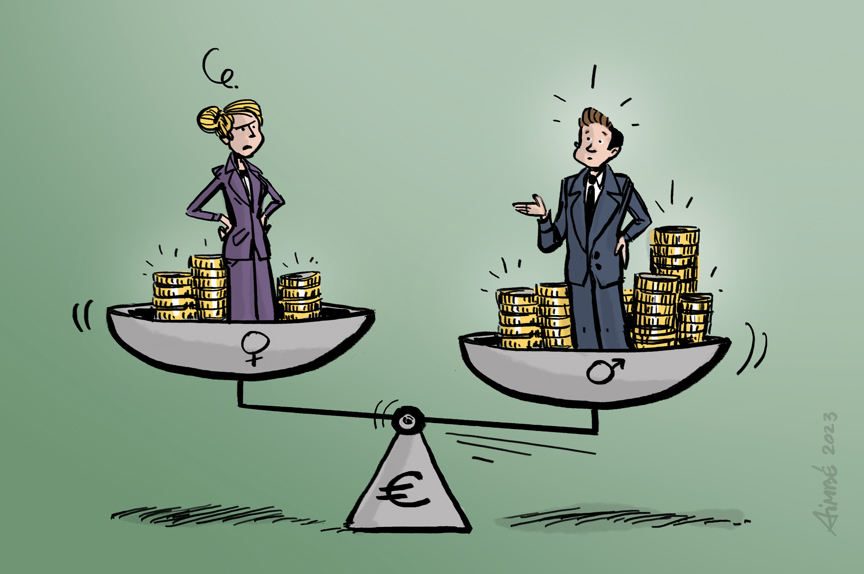- Employment Law
- Theodoti Tziatzora - Leila Mstoian
- Directive (EU) 2023/970 , equal pay , equal pay for equal work , fair treatment, equality and inclusivity in the workplace , fair treatment , equality , inclusivity , gender pay gap , equal pay for equal work between men and women , pay transparency , gender-neutral criteria
Employees’ rights have always been a central pillar of European Union regulations and laws, reflecting its commitment to ensuring fair treatment, equality and inclusivity in the workplace. However, now the European Union is undergoing significant changes in employment law that will impact both European and overseas companies.
One of the fundamental principles of the EU, equal pay for equal work, has repeatedly faced implementation challenges. The gender pay gap, hovering at around 13% across the EU, reveals persistent disparities among Member States, often obscured by a lack of pay transparency.
In this article, we will delve into the key provisions of EU legislation and discuss how this will impact both companies and their employees.

1. An EU Directive ensuring the implementation of the principle of equal pay
To address this issue, Directive (EU) 2023/970 was enacted, with the aim of ensuring that the principle of equal pay for equal work between men and women is harmoniously and effectively implemented across the EU through transparency and enforcement mechanisms. Although the Directive will not be fully enforced until June 7, 2026, it carries significant implications for employers and necessitates proactive steps. In pursuit of these objectives, this Directive has introduced binding measures and enhanced enforcement mechanisms in order to improve pay transparency, stimulate employers to review the pay structures and enable potential victims of discrimination to effectively exercise their rights.
Generally, at the heart of these measures lies the crucial concept of pay transparency and inclusivity. Pay structures are now required to be anchored in gender-neutral criteria, encompassing gender-neutral job evaluation and classification systems. Vacancy notices and job titles must adhere to gender neutrality, with recruitment processes mandated to be conducted in a non-discriminatory manner. Therefore, even before employment commences, employers are obligated to ensure gender-neutral job vacancies and titles while establishing recruitment processes devoid of bias.
Moreover, during the course of employment, employers must adopt objective and gender-neutral criteria for determining pay and facilitating pay progression. In the meantime, workers are empowered to request detailed, written information about their individual pay levels and the average pay levels, disaggregated by gender, within a maximum period of two months from the date of the request. Furthermore, employers must annually inform workers of their right to access this critical information and provide guidance on how to exercise this right. In a move that underscores the Directive's commitment to dismantling pay discrimination, workers are also granted the right to disclose their pay to support the enforcement of the equal pay principle.
2. How this rules will be enforced?
All of the aforementioned provisions would lack practical significance unless they were accompanied by the requisite mechanisms and enforcement measures to ensure their compliance and effectiveness. Therefore, the Directive on equal pay has established a robust framework of preventive and coercive mechanisms to ensure the efficacy of its measures.
It prioritizes workers' access to judicial procedures, facilitating their ability to assert their rights under the Directive. Importantly, it grants individuals the right to seek compensation or full redress for discrimination, ensuring that victims of pay inequality have efficient recourse.
To strengthen accountability, it shifts the burden of proof from the worker to the employer and streamlines access to evidence. Additionally, the Directive mandates proactive protective measures, safeguarding employees from dismissal when they exercise their rights related to equal pay.
To deter violations, the Directive imposes Member states to provide for penalties that are not only effective but also proportionate and dissuasive, which include fines that could be based on the employer’s gross annual turnover or on the employer’s total payroll. Member states should also establish specific penalties for repeated infringements. Such penalties could include different types of financial disincentives such as the revocation of public benefits or the exclusion, for a certain period of time, from any further award of financial inducements or from any public tender procedure, further reinforcing the commitment to achieving pay parity. This Directive also represents a landmark by explicitly addressing intersectional discrimination and the rights of non-binary individuals, solidifying the EU's commitment to inclusivity.
In any case, the significance of the Directive extends beyond pay transparency alone. In the event that pay reporting reveals a gender pay gap of at least 5%, employers are compelled to conduct joint pay assessments in cooperation with workers' representatives.
Therefore, this Directive encompasses a comprehensive set of measures designed to enhance pay transparency, ensure effective recourse in cases of discrimination, and establish deterrent and preventive mechanisms against pay inequality. Consequently, workers will soon have many more means to assert their right to equal pay. While certain EU Member States, such as Belgium, appear better equipped and ready to embrace these new regulations, there remains a considerable distance to cover in achieving pay equality across the board.
3. Conclusion
Directive (EU) 2023/970 represents a comprehensive effort by the European Union to fortify employment protections and promote equality in the workplace. As EU Member States work towards transposing Directive (EU) 2023/970 into national law, they are taking steps towards a more inclusive and non-discriminatory workplace environment.
This Directive not only strengthens equal pay provisions but also reinforces the EU's commitment to upholding and promoting workers' rights. Companies operating within the EU or considering expansion into European markets must be prepared to navigate these changes and ensure compliance with the new regulations.
By prioritizing transparency and equal pay, the EU aims to reduce the gender pay gap and promote fair treatment in the workplace, fostering a more equitable, diverse and inclusive workforce.
Would you like to learn more about this subject?
Contact our experts or telephone via info@seeds.law or +32 (0)2 747 40 07.
Theodoti Tziatzora - Leila Mstoian


